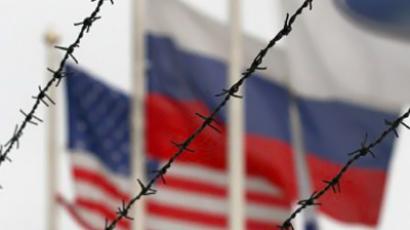Summit all-up: Much to cover at Russia-EU talks
Russian and EU officials have gathered in Brussels, where the 28th Russia-EU has opened. European debt, along with Moscow joining the WTO and steps towards a visa-free regime between the two sides are the main issues on the agenda.
The meeting started on Thursday morning with a working session at the EU Council headquarters."The meeting will be absolutely pragmatic in nature," Russian presidential aide Sergey Prikhodko previously stated. Speaking at the briefing ahead the summit, he outlined the main topics of the bilateral negotiations, saying that “the most important” are “the global economy and global governance, Russia-European relations, as well as international and regional issues.” The EU and Russian sides are expected to continue the dialog on easing visa restrictions of travel between Russia and EU countries. It is expected that the document will be signed outlining the basic conditions and possibly at the end of the year there may be a final resolution ion the topic. Right now, the document is undergoing its final fine-tuning, and there are hopes that the summit will give the green light for its implementation.“It wasn’t easy to achieve the necessary level of political will on the EU side,” said Russia’s representative in the EU, Vladimir Chizhov. “All the technical issues have long been addressed, but then there were certain political issues. Some member states tried to give the whole exercise a very broad reading and include the questions unrelated to the case, like combating corruption. I don’t know a single country in the world that has totally eliminated corruption.”
On the eve of the summit, diplomatic efforts to break down the bureaucratic walls got a major boost, as Moscow and Warsaw signed an intergovernmental agreement. That is anticipated to be the first step in creating a visa-free regime with the entire EU.The summit's agenda will include energy issues, including differences on the third energy package. This is the legislation that aims to liberalize the energy sector in the EU.What the European Union wants is essentially the unbundling of services such as transport and delivery, essentially separated between the owner and the operator of the pipeline. This has become a point of contention, because Russia’s gas giant Gazprom is currently in charge of production and transport delivery – essentially all of the activities involving gas delivery. Ways may be discussed as to how to make the market more liberal, at the same time being flexible enough to accommodate Russian interests.With regard to trade and business, Russia’s accession to the WTO, 18 years after applying, is also one of the main topics. Russia hopes that this step will launch a positive “chain reaction” in relations with the European Union.And in relation to the eurozone issues, there will be discussions on Russia’s role and potentially helping out eurozone nations though the IMF rather than the European Financial Stability Fund (EFSF). “We are exclusively interested in joint and solidarity efforts by the EU countries that could help them overcome those complex and ambiguous processes that are threatening the stability of the euro area, at least its financial stability, and could affect the scope and nature of cooperation with Russia,” Prikhodko said.One of the things which Russia offers is possibly a contribution to the IMF. Russia has been lately saying it might be willing to contribute up to 10 billion euro ($13 billion) to eurozone stabilization mechanisms – although the exact amount is still unclear. EU is Russia’s biggest trading partner. The majority of Russia’s foreign reserves are held in euro. It is clear that Russia has indicated that they would benefit from a stronger EU economy.Russia-EU negotiations will also touch upon the issues of Iran’s nuclear program, the situation in Libya, Egypt and Syria and also human rights.














